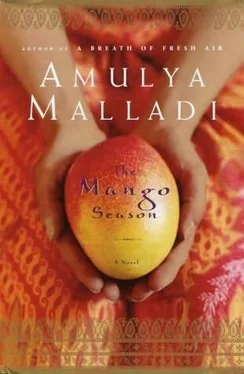She was sleeping, but the minute she heard my voice she sounded wide awake.
“They’re forcing you to marry some Indian man and you want me to say good-bye to Nick for you,” she said as soon as she heard my “Hello, Frances.”
I laughed. “No.”
“Thank god, because my policy is that everyone does their own dirty work,” Frances said and I could hear her smile. “How’s it going, Priya?”
“I can’t find Nick,” I said, now feeling foolish for having woken her up. “I… thought he might be angry with me.”
“Angry? No, I don’t think so. I just spoke with him yesterday and he was fine. Was waiting for you to come back and get married to him,” Frances said. “And speaking of marriage, I found the perfect place for you both. It’s in midtown and it’s beautiful. The gardens are lovely. And I was thinking, if we did it in the fall, this fall, we could have great pictures of the foliage and-”
“ Frances, I’m worried your son has dumped me. I don’t think I can even think about marriage,” I said, half hysterical.
“What’s one thing got to do with the other?” Frances demanded. “Find the right place to get married and I’ll make sure he shows up. He’s silly in love with you. Don’t you have faith?”
“Plenty,” I said. “Plenty back home. Here everything is murky and they made me go through this bride-seeing ceremony.”
“Like they do in the books? Was he a suitable boy?” Frances asked sounding excited. “Are you sure they made you go through it? Or did you want to?”
“Of course I didn’t want to and he isn’t suitable,” I said.
“Are you saying that a grown woman like you couldn’t stop something as simple as a bride-seeing ceremony?”
“I didn’t have the courage to tell them about Nick. Now I have and they all hate me,” I confessed.
“If this is all it takes to get them to hate you, you’re better off without them,” Frances said. “But they don’t hate you. They’re just mad and once they’re over their mad, they’ll be fine.”
“Really?”
“Well, I would be, if you were my daughter,” Frances said. “So… do I book this place for this fall or what? I was thinking early October. Not too hot, not too cold.”
“And then I can be knocked up by December?“ I asked sardonically.
“Would you?” Frances said. “That would be excellent. You could have a baby in September and… oh, that would be excellent. A September baby would-”
“ Frances!”
“I’ll tell Nick that you wanted to get in touch with him,” Frances said, sounding very satisfied. “But don’t worry about him. He isn’t going anywhere.”
We chatted for a while; Frances wanted to know how everything in Hyderabad was, including the weather. She had this romantic idea about India, the way it was shown in books as an exotic land. When I told her about the slums and the dust that settled on your entire body, even your eyelids as soon as you got here, she thought it was quaint. India was not just a country you visited, it was a country that sank into your blood and stole a part of you.
As an insider all those years ago I couldn’t see it, but now after several years of exile I could feel the texture of India. It was the people, the smell, the taste, the noise, the essence that dragged you in and kept you. I hated this country for a lot of reasons, the narrow-mindedness, the bigotry, the treatment of women, but that was all on a larger scale, on a day-to-day basis. India still was my country.
I felt light-hearted, confident, and on top of the world after speaking with Frances. That changed when I got to Thatha’s house.
I stepped into the hall and the earth shifted. This was classic Ma, classic Indian mother.
Ma and Thatha were sitting across from Adarsh on the sofa Ammamma frequented most.
“Priya,” Ma stood up nervously. “Adarsh is here to see you.”
“I can see that,” I said, my lips pursued. “Hi,” I said to Adarsh, and he nodded with a confused look on his face.
“Can you come with me?” Ma insisted, and then just in case I would say something contrary she grabbed my wrist and took me inside.
“We thought it best,” she said as soon as we were in the kitchen.
“Thought what best?” I was now very confused and very suspicious. It was always a bad thing when Ma started thinking about my best.
Ma took a deep breath, her potbelly jiggled and her hands landed on her waist in an offensive gesture. “We asked Adarsh to come here saying that you wanted to meet him one last time before you made a decision.”
I wanted to say something, anything, but the words were not forming. Each time I thought they couldn’t surpass their previous nonsense, they did.
“We think you should talk to him and see what a good boy he is before you decide anything,” Ma advised.
I shook my head as if to clear the cobwebs that had settled in as soon as I saw Adarsh. “Ma, I’ve already decided. Actually, there is nothing to decide.”
“Just talk to him,” Ma cried out. “What do you lose?”
“Does Nanna know about this?” I asked.
“No. Your Thatha and I thought it was a good idea.”
I sighed. “I’ll talk to him, but not here,” I said even before she could let the triumphant smile form on her face. “We’ll go out and I’ll talk to him. You handle Thatha about that.”
“And you’ll be good to him? Right? Speak properly? No nonsense?”
I grinned; she had to push for that extra mile. “Ma, don’t you think I’m doing enough?”
Ma frowned and muttered something that I thankfully couldn’t catch. Thatha was called into the kitchen by Ma while I asked Adarsh if he wouldn’t mind going out.
“Sure,” Adarsh nodded and then followed me onto the veranda. I slipped my feet into the Kohlapuri slippers that I had just taken off. I had bought them a few days ago when I got home and they were already showing serious signs of wear.
While Adarsh buckled his leather sandals, I asked him if he knew of a place where we could have a cup of coffee and talk.
“Sure, we can drive,” Adarsh said, pointing to a black Tata Sierra parked outside the gate that I hadn’t noticed when I’d come back.
We didn’t speak as Adarsh drove to a chaat place.
“I love chaat,” he told me. “As soon as I got here I ate chaat.”
“I lived on chaat and ganna juice while I was in college,” I said. “When I got to the U.S. I was skinny. I looked like I was a refugee from one of those sad African countries.”
“Can’t bulk up just on chaat and sugarcane juice,” Adarsh concurred. “But if you add beer to the mix…” We laughed, almost companionably.
The chaat place was a small restaurant. Not your regular roadside chaat, this one was a step up. There were probably fifteen tables covered with red-and-white checkered vinyl tablecloths. Each table had a small plastic vase where a dusty plastic red rose stood upright proclaiming its artificiality.
Adarsh asked for two bottles of water as soon as we got in. The place was practically empty except for a man sitting at a table in a corner reading a newspaper. We found a table by a window looking out at the busy road where Adarsh had parked the black Tata Sierra. A young boy of maybe ten or eleven years old, wearing a pair of oversized khaki shorts and a dirty white T-shirt, put two bottles of water on our table. A small white-and-red checkered towel rested on his shoulders and he took our order on a small notepad with a ballpoint pen that had been resting against his ear.
“Just chai? No chaat?” Adarsh asked when he heard what I wanted.
“I just had a masala dosa at Minerva. Went there with my aunt,” I said, but my mouth watered when Adarsh ordered pau bhaji.
Читать дальше











